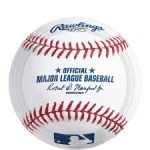JUICED BASEBALLS?
Gimme a break! If they were actually juiced, someone would have figured it out by now. MLB Commissioner Rob Manfred probably had it close to right with the simple explanation that the manufactures of the baseballs down in Costa Rica at the Rawling’s factory had come up with a better way to center the hard rubber core of the baseball.
That central core is then wrapped tightly in yarn and covered with the familiar sewn on leather cover that we all know and love to make up a baseball. The covers are hand stitched in a process which has not changed for decades, only the core seems different these days.
High School science tells us that the better balanced an object is, the better it will fly; the further it will fly and the straighter it will fly. How would you juice a baseball anyway?
However, it is clear that something is different, and it could very well have something to do with a new generation of baseball players that are now exceeding their beloved baseball ancestors, which is not exactly a new phenomenon in sports.
But, that can’t be the whole answer. MLB is now on pace to break the old record for home runs of 1.26 per team, per game set back in 2017. Back then as well people were yelling foul because so many balls were leaving the park that they thought the baseballs were juiced, and they were right. Sort of.
A Baseball Prospectus writer named Rob Arthur found evidence that the baseballs in use then were of a different composition than those of the previous year, making homeruns more likely to occur. MLB was later to confirm the validity of Arthur’s claim a week into the season. So this is nothing new.
For 2018 the home run rate dropped to 1.15 indicating a possible backlash effect for some reason. Over all the home run rate has increased steadily since 2014 when it was just 0.86 per team, per game. It went up to 1.01 in 2015 then to 1.16 in 2016 before jumping up to 1.26 for 2017. That record will certainly fall before this MLB season is all over and done with.
At the same time, MLB is also on pace to set a new strikeout record which has stood since 2008. How then are these two tied in? One contributing factor is the tighter strike zone brought on in part by the umpires’ reluctance to be out done by the electronic strike zone now in popular use.
The other is that pitchers these days are throwing the ball harder and faster than ever before. The faster a ball is going when it crosses the plate, the faster it will leave the bat if the correct angle of contact is made by the batter.
So now we are seeing three homer games by one or another team almost every day. Some even claim it’s due to global warming. Whatever. Fans and players alike love home runs, that’s a fact easily proven every time somebody hits one. Just listen. Who cares how what’s happening today compares to what it was years ago. If more homeruns bring out more fans to the ball parks, so be it.
After all the fervor and speculation are over, no one really knows how it will turn out exactly with the future makeup of the baseball. Let’s do hope that they will continue to be handmade. One thing we know, the sport of baseball will evolve and the fans will evolve and baseball will remain ‘The Great American Pastime’.








